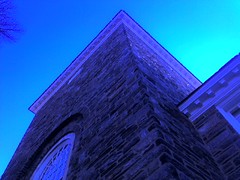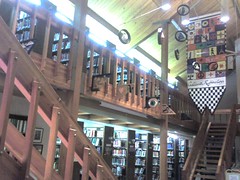 |
| I took this picture outside with my phone, looking up the front tower of this beautiful school building. |
 |
| I was lucky enough to visit the library at the end of the day. One of the most inviting school media centers I’ve seen. They also had a bronze statue of William Penn in the foyer. |
The day after I spent an afternoon at the Science Leadership Academy, I worked at the William Penn Charter School, started by William Penn himself in 1689. As an old history teacher, you can imagine the thrill. To top everything off, I got to see a 15 minute snow blizzard — maybe the only I’ll see this season, though New Brunswick, Canada does hold promise.
It was a full day, including a round table discussion with about 20 teachers, a meeting with the technology staff at WPCS, and an end-of-the-day address to the faculty and invited guests on millennials, flat world, flat schools, video games, and 21st century skills (literacy).
The highpoint was probably two forums that I facilitated with students. I’ve done this before, and the goal is to learn something from students about their perceptions of what and how they are learning, and what they see as the skills they will need in their future. In the past I’ve had much more time with the students. Here, I was with a representative groups of middle school students for a half hour and the same amount of time with the upper school students. Yet, even in such a short period of time, I continue to be amazed at how articulate, insightful, and resourceful students can be — when given the opportunity and the responsibility.
Michael Moulton, the director of technology there, recorded these conversations to make them available to the faculty of the schools. The session started with a presentation of ideas about the future: globalization, growth of information, technological advancements, projections about when we’ll have electronic paper or computers that are smarter than we are. Then I asked the students to come up with one word (maybe three) that they think best describes their future. Here are a few of the responses that I got:
- opportunity
- innovation
- international
- rapidly changing
- growth of knowledge
- life-long learning
I guess what surprised and impressed me the most was how well this 1920s building had been retrofitted with information infrastructure. The campus is wireless, all classrooms have presentation computers, projectors, and wall-mounted interactive white boards. The teachers I worked with directly showed a great deal of inventiveness in some of the activities with their students, especially English and foreign language classes.
They also exhibited a healthy amount of skepticism, as did I. One teacher came up and explained that he was teaching his students Flash. My skeptical question was, “Why?”
“Well” he said, “If my students are going to be challenged to communicate with a global audience, images and animation will be one effective way to do that.”
Good answer!
Technorati Tags: warlick education retrofitschools

David:
Great blog. I am a bit envious of the fact that you were witness to 15 minutes of snow and here in the great state of North Carolina we haven’t seen a flake. In my area that is. I was interested in your conversations with the students. Would it be possible to share those? I think we could all learn from the student’s insights.
Thanks for being so helpful with, well, everything ;o)
Danita
When are you coming to New Brunswick? And to what city? It would certainly be worth an afternoon to sit down and chat. Maybe even a free meal, if you play your cards right. 😉
I’m afraid that I can’t share the recordings, because they are in-house and all sorts of security issues as well. I have to say that the longer sessions are much more insightful. I did one a while back in Ontario, and blogged about it, I think. The students there worked on wikis to report their conversations, conclusions, and suggestions — all of which was available to teachers in the district.
All that said, this is very challenging to students. They have been programmed to think our way, when it comes to education. It is very difficult for them to think that they are learning, when they are playing video games or interacting through social networks. It just doesn’t look like a classroom.
I think that the sort of dialog that we engaged in that day needs to be ongoing, an integral part of how we manage and adapt our schools and classrooms.
I’m in Fredericton, NB in March, a fact that makes me a little nervous. We don’t have a lot of experience with driving in the snow down here, and I think I’ll have to be doing some driving. I am greatly looking forward to the work, though.
Specifics, directly to you Stephen!
Dave…
We won’t make you drive…:)…and the way things are going spring should be coming any day now anyway…:(
Jeff
…don’t worry…the dogs know the way anyway…:)